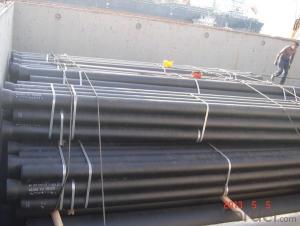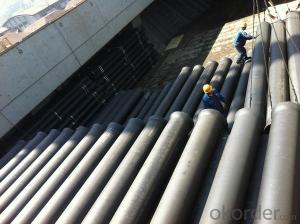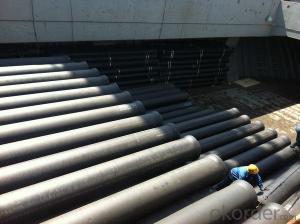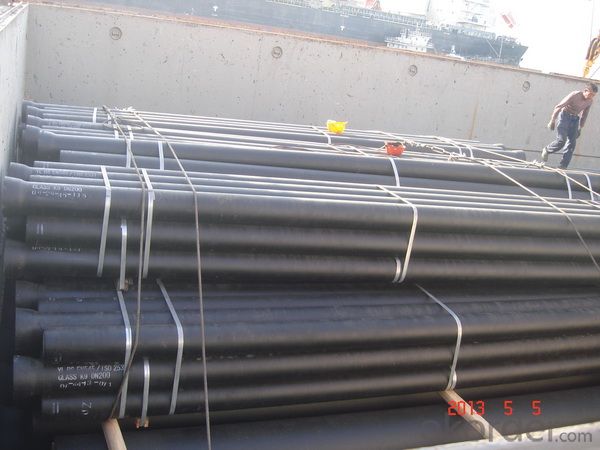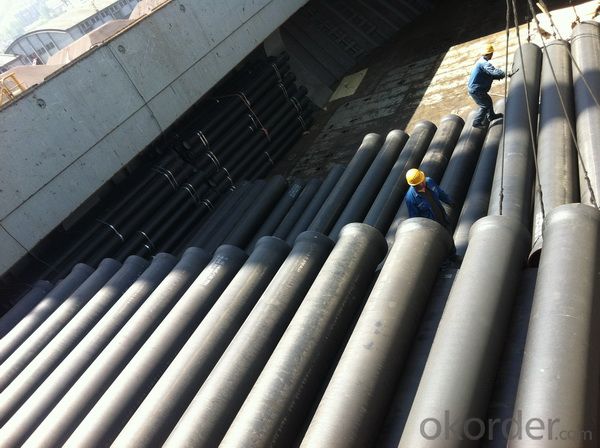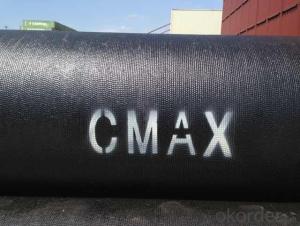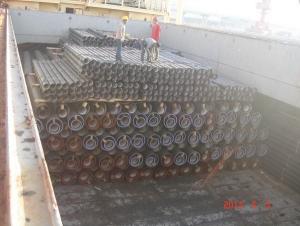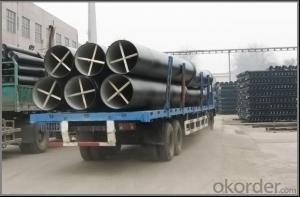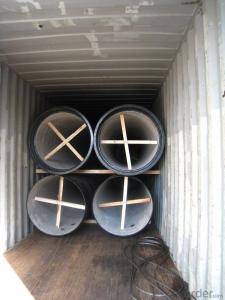DUCTILE IRON PIPE DN200 K7 CLASS
- Loading Port:
- Tianjin
- Payment Terms:
- TT OR LC
- Min Order Qty:
- -
- Supply Capability:
- 30000Tons m/month
OKorder Service Pledge
OKorder Financial Service
You Might Also Like
CNBM ductile iron pipe ranges from DN80-DN1600mm (T-Type, Class K9), effective length 6m, comply with ISO2531 Standard
Company Profile
CNBM International Corporation is the leading production base and renowned supplier of Ductile Iron Water Pipe systems of both potable and waste water in China. We are constantly looking to develop high quality products to ensure the longest service life and wonderful performance.
CNBM Pipelines regard quality as the essential factor leading to successful business. Every pipe is tested in accordance with BS EN545 (water application) or BS EN598 (sewer application). CNBM Pipelines products comply with and are tested according to the relevant European and International Standards. Our pipes are manufactured under the quality management system BS EN ISO 9001. After years of efforts, CNBM Pipelines has built up great reputation in terms of quality and service among customers worldwide
Product Introduction
CNBM ductile iron pipe ranges from DN80-DN1600mm (Tyton, T-Type, Class K7/K8/K9), effective length: 6m, complying with BS EN545/EN598/ISO2531/BS4772.
Specification& Payment terms
Internal lining: Pipes shall have an internal cement mortar lining in acc with ISO4179.
External coating: Pipes shall be externally coated with metallic zinc spray plus a further layer of resin painting to ISO8179.
Gasket: 100% SBR/NBR/EPDM gasket in accordance with ISO4633.
Packing: Pipes from DN100 to DN300 be bundled with steel belts, the others are in bulk.
Payment term: By 30% T/T advance payment + 70% Irrevocable L/C at sight.
Packing: In bulk vessel or in container.
- Q: Steel plastic pipe, ductile iron pipe, steel pipe difference
- Spheroidal graphite tube, now application has been relatively small, generally used for conveying water, gas at room temperature, low pressure, large diameter pipelines need to produce concrete pipe base, good corrosion resistance than steel pipe joints, vulnerable to external extrusion and leakage, the price is relatively cheap.
- Q: Can ductile iron pipe be used for industrial wastewater applications?
- Yes, ductile iron pipe can be used for industrial wastewater applications. Ductile iron pipe is known for its strength, durability, and resistance to corrosion, making it suitable for various applications including wastewater systems. It can handle high-pressure and heavy-duty environments, making it ideal for industrial wastewater applications that may involve abrasive or corrosive substances. Additionally, ductile iron pipe can be easily installed and maintained, reducing the overall costs and ensuring long-term reliability. However, it is important to consider the specific requirements of the wastewater application and consult with professionals to determine the most suitable pipe material and design.
- Q: How are ductile iron pipes protected against internal scaling or buildup?
- Various methods are utilized to protect ductile iron pipes against internal scaling or buildup. One widely employed technique involves applying a cement mortar lining to the inner surface of the pipes. This lining serves as a protective barrier, preventing the formation of scale or buildup and facilitating the smooth flow of water or other fluids. Moreover, an additional layer of polyethylene or other appropriate materials can be coated onto the pipes to provide an extra level of protection against scaling or buildup. This coating acts as a barrier between the water and the iron surface, thereby reducing the likelihood of corrosion or scale formation. Regular maintenance and cleaning play a crucial role in preventing internal scaling or buildup in ductile iron pipes. By flushing the pipes with high-pressure water or employing chemical treatments, any accumulated scale or debris can be effectively removed, ensuring the pipes remain clean and fully functional. Furthermore, proper water treatment is essential in minimizing the risk of scaling or buildup. By implementing suitable water treatment processes, such as pH adjustment or the use of corrosion inhibitors, the quality of the water can be maintained, preventing the formation of scale or buildup inside the pipes. In conclusion, various measures, including cement mortar lining, pipe coating, regular maintenance, cleaning, and proper water treatment, are employed to protect ductile iron pipes against internal scaling or buildup. These measures ensure the longevity and efficiency of the pipes, minimizing the chances of clogging or reduced flow capacity.
- Q: Can ductile iron pipes be used for underground compressed air systems?
- Underground compressed air systems can utilize ductile iron pipes due to their high strength and durability. These pipes are suitable for various applications, including underground installations, thanks to their corrosion resistance. This is especially important in underground systems where moisture and other environmental factors can cause damage over time. Moreover, ductile iron pipes have the capability to withstand high pressure, making them a dependable choice for compressed air systems. However, it is crucial to ensure proper installation of the pipes, including adequate support and protection, to prevent any damage or leaks. To maintain the longevity and efficiency of the underground compressed air system, regular maintenance and inspection should also be carried out.
- Q: What is the expected abrasion resistance of ductile iron pipes?
- The expected abrasion resistance of ductile iron pipes is generally high. Ductile iron pipes are known for their durability and strength, making them suitable for various applications, including transporting water, sewage, and other fluids. The material composition of ductile iron pipes, which includes a significant amount of carbon and silicon, contributes to their abrasion resistance. Ductile iron pipes are designed to withstand the abrasive forces that can occur during the transportation of fluids. They have a smooth internal surface that reduces friction and minimizes the potential for abrasion. Additionally, the material's inherent toughness and resistance to wear and tear make ductile iron pipes less prone to damage caused by abrasive particles or debris in the flowing fluid. However, it is important to note that the expected abrasion resistance of ductile iron pipes can also depend on various factors such as the velocity and nature of the fluid being transported, the presence of corrosive substances, and the installation conditions. In some cases, additional protective measures such as linings or coatings may be required to enhance the pipes' resistance to abrasion. Overall, ductile iron pipes are known for their excellent abrasion resistance, but it is always advisable to consider specific application requirements and consult with experts to ensure the appropriate selection and installation of the pipes for optimal performance and longevity.
- Q: Can ductile iron pipes be used for underground cable conduits?
- Yes, ductile iron pipes can be used for underground cable conduits. Ductile iron pipes are known for their strength, durability, and corrosion resistance, making them suitable for various applications, including underground cable conduits. Their ability to withstand heavy loads and external pressures makes them a reliable choice for protecting and housing underground cables.
- Q: How is ductile iron pipe different from other types of pipes?
- Ductile iron pipe differs from other pipe types in several ways. To begin with, its exceptional strength and durability are well-known. It is composed of a unique combination of iron, carbon, and other alloying elements, giving it superior mechanical properties compared to other pipes. Consequently, ductile iron pipe is highly resistant to external forces and pressure, making it ideal for underground installations, water mains, and sewer systems. Moreover, ductile iron pipe exhibits excellent corrosion resistance. Typically, it is lined with cement mortar or an internal coating, which acts as a protective barrier against corrosion and lengthens the pipe's lifespan. This makes ductile iron pipe particularly suitable for transporting water and other fluids, as it prevents contamination and maintains the material's quality. Additionally, ductile iron pipe offers a high level of flexibility. Unlike more rigid pipe materials such as cast iron, ductile iron pipe can withstand moderate deflection and ground movement without fracturing or breaking. This flexibility reduces the risk of failure and decreases the need for expensive repairs or replacements. Finally, ductile iron pipe is relatively easy to install and maintain. Usually, it is available in long lengths, minimizing the number of joints required. Furthermore, its mechanical properties and corrosion resistance make it less prone to damage during installation or operation, resulting in lower maintenance costs over time. In conclusion, ductile iron pipe stands apart from other pipes due to its exceptional strength, corrosion resistance, flexibility, and ease of installation. These characteristics make it a reliable and cost-effective choice for various applications, particularly in the water and wastewater industry.
- Q: How long do ductile iron pipes last?
- Ductile iron pipes have a lifespan of about 100 years or even more, making them a highly durable and long-lasting choice for water and sewage systems.
- Q: How much pressure can the ductile iron pipe socket meet?
- After all, he is not steel, strength is low, toughness is poor. But a short period of about 100kg, things should be no problem.
- Q: Are there any limitations to the length of ductile iron pipe sections?
- Yes, there are limitations to the length of ductile iron pipe sections. The length of ductile iron pipe sections is typically limited due to practical considerations such as transportation, installation, and handling. Longer pipe sections can be more difficult to transport and maneuver, especially in areas with limited access or challenging terrain. Additionally, longer pipe sections may be more prone to damage during installation, as they can be more difficult to align and join properly. There are also limitations in terms of manufacturing capabilities. Ductile iron pipes are typically manufactured in standard lengths, which can vary depending on the manufacturer and the specific application. These standard lengths are typically designed to balance the needs of transportation, installation, and the overall performance of the pipe. Furthermore, longer pipe sections may pose challenges in terms of expansion and contraction due to temperature variations. Ductile iron pipes are susceptible to thermal expansion and contraction, and longer sections may experience greater stress and strain as a result. Therefore, while there is no absolute limit to the length of ductile iron pipe sections, practical considerations and manufacturing capabilities often result in the use of standard lengths that balance various factors such as transportation, installation, and performance.
Send your message to us
DUCTILE IRON PIPE DN200 K7 CLASS
- Loading Port:
- Tianjin
- Payment Terms:
- TT OR LC
- Min Order Qty:
- -
- Supply Capability:
- 30000Tons m/month
OKorder Service Pledge
OKorder Financial Service
Similar products
Hot products
Hot Searches
Related keywords
